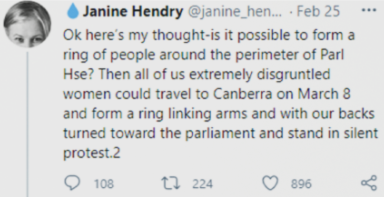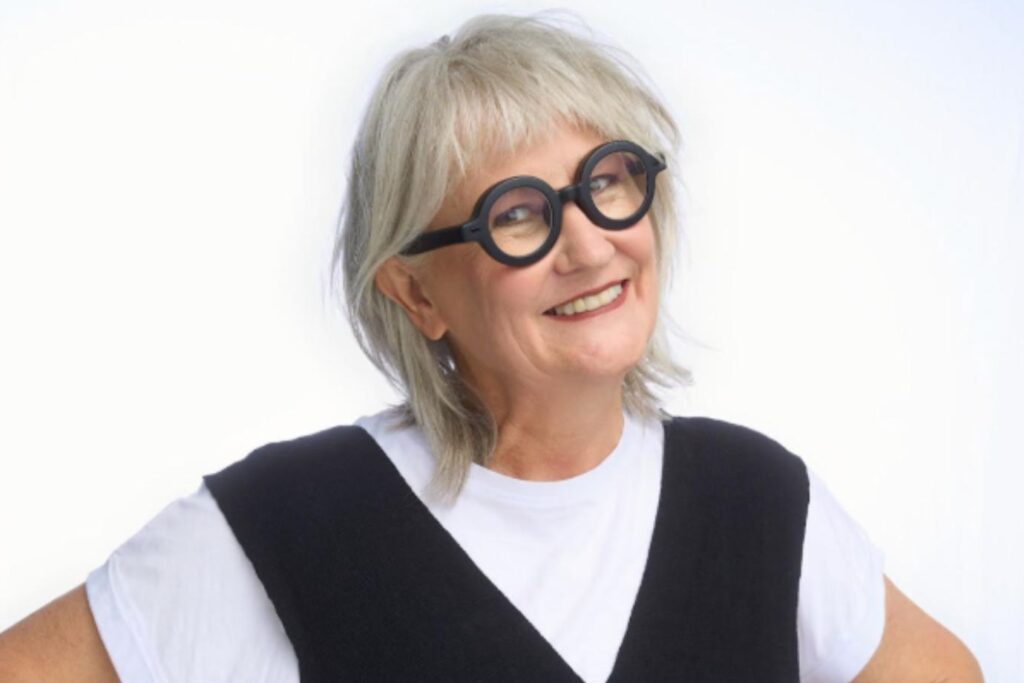Janine Hendry first came on to so many of our radars in early 2021 when her single tweet ignited the March 4 Justice. Upwards of 210,000 people rallied across Australia (including on the lawns of Parliament House) in support of women’s rights and justice.
Prior and since the March 4 Justice, Janine writes and speaks on feminism, ageing, and politics through her substack and works as a counsellor supporting women to navigate transitions and reclaim their power. In early 2025, she also ran as an independent candidate in the Prahran by-election.
Let’s hear Janine’s inspirational story on how she ‘gets political’…
Thanks for joining us Janine. First, please tell us about the ‘aha’ moment that ignited your interest in getting political? What first motivated you?
My interest in politics didn’t arrive like a lightning bolt; it was more like a steady pressure building up over time. I grew up in a family where politics was always on the table. I was taught that ignoring politics was a form of privilege, a luxury only available to those who could afford to believe it didn’t affect them. For me, politics has always been personal.
But the ‘aha’ moment came at exactly 10:42 am on Thursday 25 February 2021. I was reading the papers: Brittany Higgins’ rape was headline news, rumours about Christian Porter were swirling, Barnaby Joyce’s “not-an-affair” scandal was unfolding, and Dyson Heydon’s behaviour in the High Court was being reported. I sat in my living room and cried.
My then 15-year-old son, Charlie, walked in and asked why I was crying. All I could think was: I’ve raised him to be a feminist, and in a few short years he will step into a world where these men, lawmakers and judges, are the role models he will encounter. What does that mean for women? For equality? For young men learning from their example?
In that moment I thought, God help us all. I didn’t know what to do. But I pulled out my Doc Martens and thought: I’ll go to Canberra and confront these men. Naïve? Yes. I sent out a tweet (shown below). Within hours, March 4 Justice was born.

How did you take the all important first step?
The first step wasn’t dramatic, but it was decisive. I cried, I tweeted, and then I started talking out loud to anyone who would listen about what was happening, why it mattered, and why silence was no longer an option.
Then came the organising for March 4 Justice. At first it was daunting; politics can feel like an insiders’ club. But once I took that first step, I discovered there were thousands of others just waiting for someone to say: let’s do this together. That’s when I truly understood the power of collective courage.
What have you done to ‘get political’? Tell us about your political journey.
My political journey has been both deeply personal and undeniably public. The most visible moment was founding March 4 Justice. What started as a tweet and then a Facebook group became a national movement. More than 210,000 people marched across the country, demanding justice, safety, and respect. That put me on the political map, but it was only one part of the journey.
I’ve also worked as a policy adviser, strategist, and community organiser. I founded and built a charity that has built schools across the world and I’ve shaped advocacy campaigns, mentored emerging activists, and built spaces where women’s voices are amplified. For me, politics has always been about shifting conversations, from silence to visibility, from dismissal to accountability.
In 2025, I took another step: I stood as an Independent in the Prahran by-election. The incumbent, Sam Hibbins, had resigned after revelations of an inappropriate relationship with a staffer. The campaign was brutal. Advance Australia came out to “test the waters,” and I saw firsthand how misogyny operates to hold power. I didn’t come close to winning, but I learned something vital: there are many ways to drive change, and they don’t all have to come from inside the system.
Thinking back to the March 4 Justice – what are your reflections of that time?
The March was extraordinary and humbling. To see more than 210,000 people, most of them women, many carrying stories of harm and resilience, come together was overwhelming. It was a visible, undeniable reminder that people power still matters.
But my reflections aren’t only celebratory. The March also exposed the resistance within political institutions to hearing women’s voices. We called for systemic change. The government’s first instinct was to minimise and deflect. That contrast; the grassroots energy versus institutional denial, shaped how I now see politics: real change requires relentless public pressure just to open the door.
What do you do now to ‘get political’?
Getting political doesn’t always mean standing on the steps of Parliament House. These days, I’ve turned back to my original profession. I’m a qualified counsellor, and I now work with women navigating change, helping them reclaim their voices and design their futures.
I also write. I publish on Substack about feminism, ageing, and politics, and I have a book coming out next year. I speak, mentor, and use every platform I have to keep issues of equality, justice, and safety on the agenda.
And I still stay engaged: signing petitions, meeting MPs, supporting campaigns, and challenging complacency. Politics is a muscle, the more you use it, the stronger it becomes.
Why do you think it’s important to engage in politics and in our democracy?
Because politics touches everything. From the price of groceries to the safety of our streets, from healthcare to how we respond to violence, politics sets the rules we all live by. If we don’t participate, those rules are written without us.
For women, this is especially urgent. Too many of the laws shaping our lives have been written by men, for women. Without our lived experience shaping policy, those rules don’t serve us. To create real change, we must be part of rewriting the rules so they reflect our needs and realities.
Democracy only thrives when people show up. Otherwise, it becomes a closed circle of insiders making decisions for themselves. Engagement isn’t about having all the answers; it’s about showing you care enough to ask the questions and demand better.
Please share a highlight you’ve experienced while getting political? What’s an event that stands out to you?
The most powerful moment was standing on the lawns of Parliament House during the March, hearing the roar of tens of thousands chanting for justice. It was history unfolding and a moment when women’s voices could not be ignored.
But there are quieter highlights too. Seeing young women step into leadership because they felt inspired. Watching survivors of violence speak with dignity and finally be heard. These moments remind me that change isn’t just measured in laws or policies, but in the courage of individuals who refuse to be silenced.
What’s something unexpected you’ve experienced when getting involved in politics?
What I didn’t expect was the personal cost. Speaking truth to power attracts resistance, sometimes criticism, sometimes outright hostility. The abuse, the threats of violence, the death threats – they take their toll.
But equally unexpected was the solidarity. Strangers sent messages of encouragement. Women said, You gave me the courage to speak. That balance, hostility on one side, solidarity on the other, taught me resilience. And it reminded me: real change is never comfortable.
Now that you are political – what’s your overall view of the political landscape – and what weren’t you expecting?
The political landscape is shifting, but slowly. We’ve seen progress: more women in parliament, more diversity in leadership, and more willingness to name structural inequality. But entrenched power resists change. The system still serves itself.
What I didn’t expect was just how much persistence it takes. Change rarely happens overnight. It takes constant pressure, repeated conversations, and the strength to keep going even when you feel ignored. My view now is realistic: politics is both frustrating and hopeful. It’s slow, messy, imperfect; but absolutely necessary.
And finally – please share advice for anyone thinking about ‘getting political’ – including a good first step to take?
Start small, but start. Write to your local MP. Go to a community meeting. Sign a petition. Begin talking openly about the issues that matter to you. Don’t wait until you feel ready, none of us ever do. Politics doesn’t need experts; it needs people who care.
And don’t do it alone. Find your people. Build networks. Join forces Collective action multiplies courage.
Above all: tell your story. Without lived experience shaping change we’ll only get more of the same. Your story matters. Share it; because change begins when ordinary people decide to get involved.
***
Thank you Janine Hendry for sharing your story for our Let’s Get Political profile series. As Janine highlights ‘democracy only thrives when people show up’ – and she’s certainly done that! Now – how will you get political?
Also see other profiles in the Let’s Get Political series:


